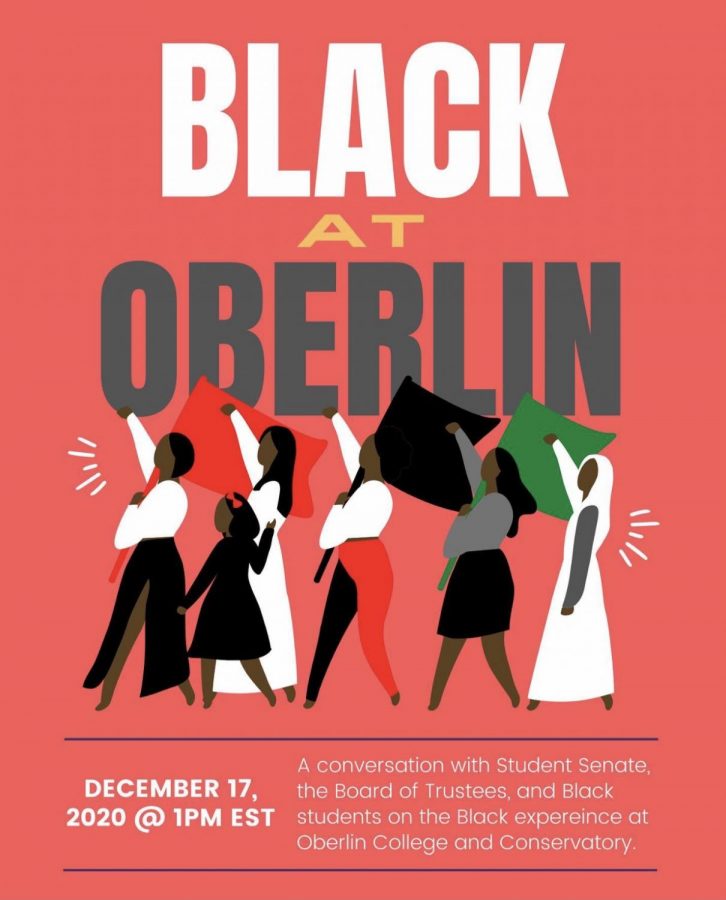Black Senators, Student Panelists Address Trustees on Racial Equity
Student Senate worked to educate the Board of Trustees on the Black experience at Oberlin during a December panel discussion.
Over winter break, student senators presented a panel and led a discussion about the experience of Black students to the Board of Trustees. They discussed issues Black students face on campus and how to incorporate the June 2020 ABUSUA demands for institutional and cultural change into the 2020 Presidential Initiative.
President Carmen Twillie Ambar announced the Presidential Initiative last May in response to ongoing conversations about racial inequality and violence after the death of George Floyd. The initiative seeks to educate the Oberlin community about injustice and pursue racial equity.
The panel was moderated by College fourth-years Henry Hicks and Jasmine Mitchell, who serve as chair and vice-chair of Student Senate, respectively. Panelists included Conservatory fourth-year Georgia Heers, College fourth-year Blessing Bwititi, College third-year Diwe Augustin-Glave, and Student Senator and College third-year Darielle Kennedy.
“The goal was to elevate the experiences and issues, varied as they are, within the Black community and to brainstorm with the Board on ways it can address its strategic vision for the College to address these issues,” Mitchell wrote in an email to the Review. “While we had [only a] short time, I think this event opened a vital conversation about the Black student experience at Oberlin and what role specifically the Board of Trustees has to play in improving that experience.”
After the panel discussion, attendees dispersed into breakout rooms with panelists, trustees, and moderators to discuss Black students’ Oberlin experiences and the demands that ABUSUA released last summer.
Mitchell spoke about the importance of having a panel discussion in which the voices of multiple Black students can be heard.
“I will never be able to speak to the nuances that exist within the Black experience on campus,” Mitchell wrote. “This panel created a vital forum for the nuances within the Black experience to be brought to light so all the powerful actors on campus have an uncensored lens of the realities and issues that exist at Oberlin.”
Prior to the meeting with Student Senate, the board met to discuss the Presidential Initiative. According to President Ambar, four action steps for the board came from this meeting: engaging with literature and other educational materials to educate themselves on anti-racist efforts, developing a statement, scheduling another meeting, and continuing to support student work in this arena. Board members also discussed additional opportunities, such as the creation of the Center on Race, Equity, and Diversity and recommendations for the Presidential Initiative.
According to President Ambar, the discussion was also a place for Oberlin alumni to clarify differing experiences with their peers.
“For the Black folks on the board, there was a sort of a suggestion, ‘The experience that you had at Oberlin was different than the experience that white students have, and I want you to know that, and I want you to have the type of curiosity that a liberal arts education teaches you about that experience,’” she said.
Though students initially hoped to speak with the board prior to or during this early December meeting, President Ambar was intentional in scheduling the Senate-run special session for the following week.
“I’m glad that we structured it in the way that we did, because I think … the Board will now have context and to be able to more effectively hear students’ narrative a week or so from now because of the conversation we had as a board the past two days,” President Ambar said.
Chair of the Board of Trustees Chris Canavan, OC ’84, expressed concerns that the board often uses its role as a strategic development entity as a “shield” against hands-on engagement. However, he hopes that these sessions will encourage a shift in this mindset.
“There was a long conversation about figuring out how [we can] be a lot more honest with ourselves about the history of this institution — because, yes, everybody knows how Oberlin was founded in the crucible of abolitionism,” Canavan said. “And the complete story is a lot more complicated and a lot less inspiring than that in many ways.”
The City of Oberlin was a stop on the Underground Railroad, and the College was the first to have an admissions policy of not discriminating against Black applicants a couple years after it opened in 1833. However, this legacy has not precluded the College from harming Black students throughout its history.
Canavan hopes the board will reckon with and understand the College’s complex history.
“Coming to terms with that is something that we have to figure out how to do,” Canavan said. “If we fail to do it, I think we should feel nothing but shame.”
In an effort to combat continuing inequalities, Mitchell and Hicks worked to ensure panelists were compensated financially for their time.
“Very often Black students are called upon for a panel centered around Racial Equity and Inclusion but are rarely compensated for their intellectual and emotional labor … [perpetuating a] cycle of invisible labor that exists in these spaces,” Mitchell said.
In addition to the panel, trustees attended Diversity, Equity, and Inclusion training sessions over the break. The next full board meeting will take place March 4-5. President Ambar hopes that future discussions will lead to tangible change at the institutional level.
“It may be one of the more important conversations we’ve had at the board level,” Ambar said. “Having these conversations again and again, each layered one brings different understanding, different appreciation. … As I said to the commission, ‘I’m not really interested in another one of those little discussions that people have about race. I’ve had plenty of those in my career. Let’s see if we can do something that has impact.’”







